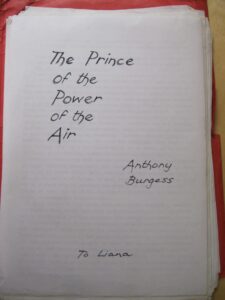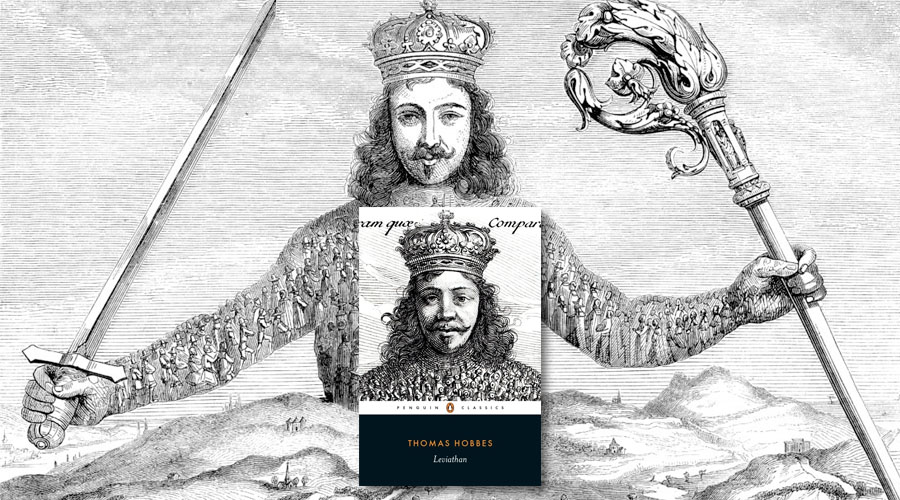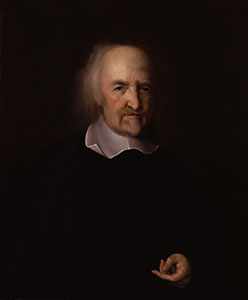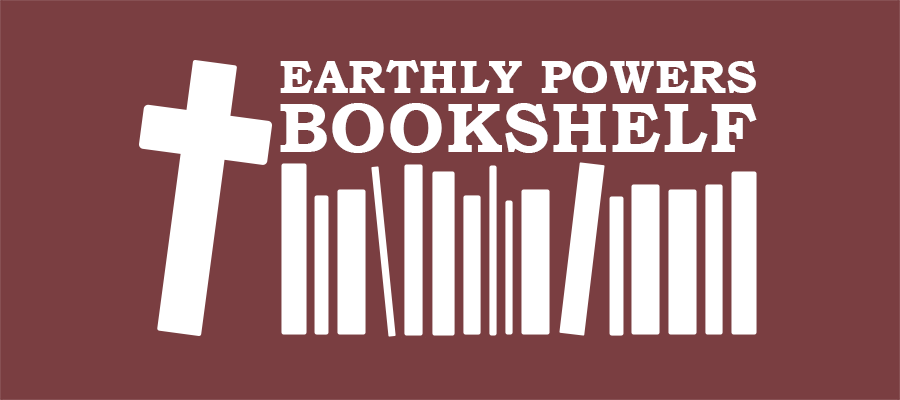The Earthly Powers Bookshelf: Leviathan by Thomas Hobbes
-
Will Carr
- 30th October 2020
-
category
- Blog Posts
Anthony Burgess’s Earthly Powers is a book made up of other books. The Earthly Powers Bookshelf charts that literary map, using as its base Burgess’s library at the International Anthony Burgess Foundation.
In his article ‘Why I Wrote Earthly Powers’, Anthony Burgess explains that the original title of the novel was The Prince of the Powers of the Air. This is taken from Leviathan by Thomas Hobbes, a 1651 treatise on the structure of government and society that has had a profound influence on Western thought since the Enlightenment.
Burgess describes the original title of his novel as ‘highly, Europeanly ambiguous. The air is full of devils and their prince evil. The novel is about the difficulty of deciding what is good and what is evil.’
 The Prince of the Power of the Air is a name for Satan, and first appears in Ephesians 2:2. Hobbes’s Satan is the embodiment of ‘a Confederacy of Deceivers that, to obtain dominion over men in this present world, endeavour, by dark and erroneous Doctrines, to extinguish in them the Light, both of Nature and of the Gospell; and so to dis-prepare them for the Kingdome of God to come.’
The Prince of the Power of the Air is a name for Satan, and first appears in Ephesians 2:2. Hobbes’s Satan is the embodiment of ‘a Confederacy of Deceivers that, to obtain dominion over men in this present world, endeavour, by dark and erroneous Doctrines, to extinguish in them the Light, both of Nature and of the Gospell; and so to dis-prepare them for the Kingdome of God to come.’
This passage from Leviathan is quoted in full by Kenneth Toomey in Earthly Powers as he reflects on the nature of evil as he rides in an Italian taxi. Hobbes finds ‘deceivers’ among philosophers, historians and writers, and significantly for Burgess’s novel, among church leaders, whose possibly deliberate misinterpretation of scripture and preoccupation with worldly concerns pervert the truth and take humankind away from the kingdom of God: is Toomey’s ambiguous brother-in-law, Carlo Campanati, later Pope Gregory, one of these?
Burgess’s 1973 copy of Leviathan is in the book collection at the Burgess Foundation, and it is clear that Hobbes’s writing informs his own. Hobbes’s fear of a brutal state of nature – famously, ‘a war of all against all’ – flowing from the problem of evil in the world is explored in A Clockwork Orange, where unrestrained energy and violence is tamed by authority.
Yet the cure is worse than the cause, and the brutality of the delinquents is overwhelmed by the greater brutality of the state: Burgess has a deep suspicion of Hobbes’s ideal of strong government, and its propensity to become a ‘confederacy of deceivers’ itself.

Similarly, in The Wanting Seed, the overweening state traps its citizens in a dystopia of overpopulation and cannibalism. History in this novel is presented as cyclical, moving between ‘Pelphase’ (named for Pelagianism, characterised by the belief that people are fundamentally perfectible), during which people run riot; ‘Interphase’, where the dream of perfectibility begins to sour and the state becomes more totalitarian as a result; and ‘Gusphase’, named for Augustiniansism, characterised by the belief that people are not perfectible and are unable to escape their state of original sin.
It becomes clear that despite this, humanity is capable of goodness – so the rules are relaxed once more and Pelagianism is reinstated. This almost Marxist vision of history as a cycle of struggle is Hobbesian in its stark conclusions – none of these ‘phases’ can solve the problem.

Earthly Powers is linear rather than cyclical in its approach to its historical narrative, with Kenneth Toomey observing or even directly participating in many major world events. Part of the architecture of the novel is structured by the conflict that takes place throughout the twentieth century – both world wars and the rise of fascism in Italy and Germany feature, as well as the aftermath of the Holocaust. Later, the fight for civil rights in the USA and the massacre at Jonestown in Guyana are key points in the unfolding story.
These various conflicts are set against Toomey’s own search for peace: constantly on the move, buffeted by history, Toomey’s restless life is his Hobbesian state. For Hobbes, reason is the solution: it is reason that can finally reveal the laws of nature, and enable humankind to find peace.
Yet Burgess’s Toomey is much more complicated than that, and one of the most striking aspects of Earthly Powers as a whole is its emotional range. Love, loss, triumph and disaster, joy and grief are all here, as befits Toomey’s long and eventful journey.
While Hobbes’s bleak vision provides some of the building blocks for Burgess’s novel, it its ultimately eclipsed by Burgess’s own complicated, contradictory and entirely humane exploration of life.
Pictured above: Leviathan stamp (credit: Magasin Pittoresque) with Leviathan Penguin book cover.
Throughout 2020, the Burgess Foundation is celebrating the fortieth anniversary of Earthly Powers, of which this series is a part. Find out more about the Earthly Powers 40 project.





